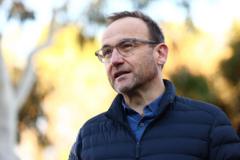On May 8, 2025, the Vatican's conclave faced a setback as black smoke emerged, signaling that the cardinals had not yet elected a new pope. This marks the second day of deliberations with expectations of further voting to come.
Black Smoke Signals Continued Impasse in Vatican Conclave

Black Smoke Signals Continued Impasse in Vatican Conclave
The Vatican’s selection process for a new pope remains stalled as black smoke rises, indicating no consensus among cardinals after multiple votes.
In a dramatic display of uncertainty, black smoke billowed from the chimney of the Sistine Chapel on Thursday morning, indicating that cardinals at the Vatican have yet to select a new pope. With the aftermath of Pope Francis’ passing propelling the conclave into its second consecutive day, hopes of electing a successor before day’s end have begun to dim.
The crowd gathered in St. Peter’s Square expressed their disappointment as the results of the latest round of voting fell short. Cheers faded into groans when it became clear that none of the 133 voting cardinals had garnered the necessary two-thirds majority. This marks a crucial moment in an election process that is one of the oldest and most sacred traditions in the Catholic Church.
As cardinals take a break for lunch, speculation continues to grow over the possible outcomes of this conclave, the first since Francis' death and unprecedented in its size and diversity. Over the course of the day, crowd expectations fluctuated, as many had imagined the new pope's emergence by nightfall based on recent conclaves, which typically ran shorter.
Despite the historical backdrop — the selection process has been known to take anywhere from mere hours to nearly three years — the cardinals are expected to engage in four rounds of secret ballots each day until consensus is achieved. Secrecy is paramount during this process, as cardinals remain shuttered away to ensure their discussions and decisions remain leakproof from external influences.
Within the assembly, factions have emerged, as differing perspectives on Pope Francis' legacy create divisions among the cardinals. Progressive and conservative camps are locked in a struggle over the future direction of the Church, highlighting both the challenges of unity and the evolving dynamics of the electorate.
Rumors of potential papal candidates such as Cardinal Jean-Marc Aveline from France or Peter Erdo from Hungary circulate among the faithful, who wait eagerly for a resolution. The world watches as this historic selection unfolds in silence, waiting for the telltale rise of white smoke that will signal a resolution to this momentous conclave.
The crowd gathered in St. Peter’s Square expressed their disappointment as the results of the latest round of voting fell short. Cheers faded into groans when it became clear that none of the 133 voting cardinals had garnered the necessary two-thirds majority. This marks a crucial moment in an election process that is one of the oldest and most sacred traditions in the Catholic Church.
As cardinals take a break for lunch, speculation continues to grow over the possible outcomes of this conclave, the first since Francis' death and unprecedented in its size and diversity. Over the course of the day, crowd expectations fluctuated, as many had imagined the new pope's emergence by nightfall based on recent conclaves, which typically ran shorter.
Despite the historical backdrop — the selection process has been known to take anywhere from mere hours to nearly three years — the cardinals are expected to engage in four rounds of secret ballots each day until consensus is achieved. Secrecy is paramount during this process, as cardinals remain shuttered away to ensure their discussions and decisions remain leakproof from external influences.
Within the assembly, factions have emerged, as differing perspectives on Pope Francis' legacy create divisions among the cardinals. Progressive and conservative camps are locked in a struggle over the future direction of the Church, highlighting both the challenges of unity and the evolving dynamics of the electorate.
Rumors of potential papal candidates such as Cardinal Jean-Marc Aveline from France or Peter Erdo from Hungary circulate among the faithful, who wait eagerly for a resolution. The world watches as this historic selection unfolds in silence, waiting for the telltale rise of white smoke that will signal a resolution to this momentous conclave.





















